HSTA: Holualoa Elementary in ‘crisis’
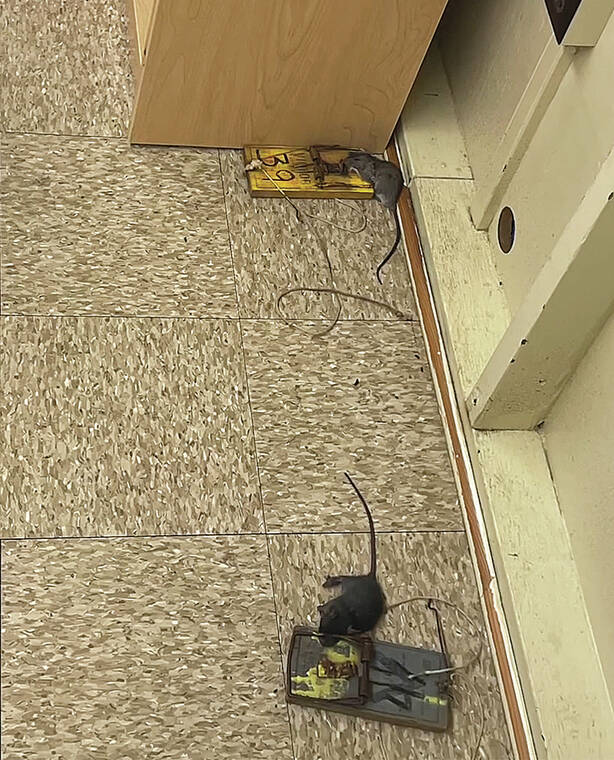
Traps with rats are seen at Holualoa Elementary School. (HSTA Courtesy photo/Special to West Hawaii Today)

Holualoa Elementary School's campus is seen in this aerial photo. Hawaii’s teachers union, educators and parents Monday called out the state for what they say is a lack of action in addressing mold and rats in classrooms, structural damage and other persistent problems at Holualoa Elementary School. (HSTA Courtesy photo/Special to West Hawaii Today)
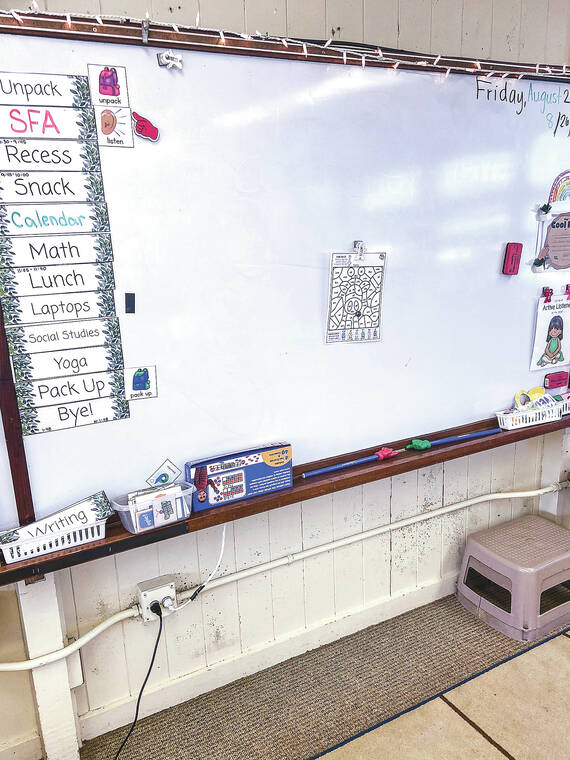
Mold is visible in a Holualoa Elementary School classroom. (HSTA Courtesy photo/Special to West Hawaii Today)

Mold is visible in a Holualoa Elementary School classroom. (HSTA Courtesy photo/Special to West Hawaii Today)
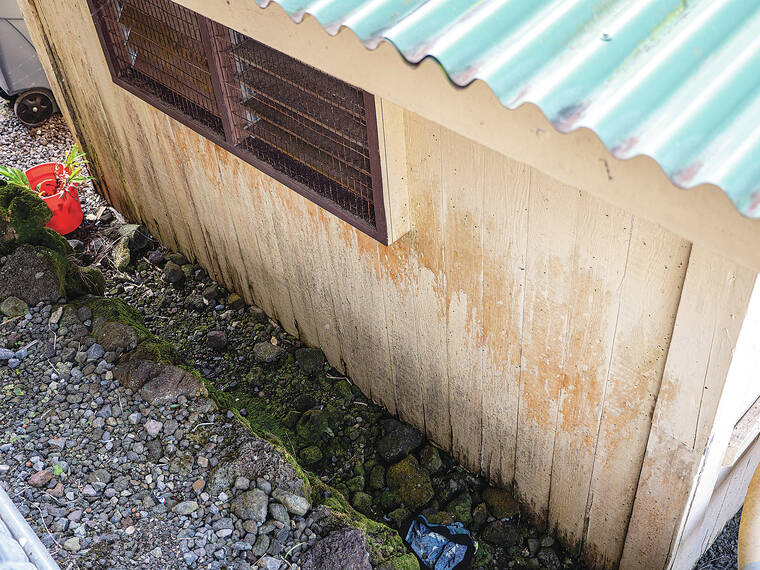
Mold grows on the outside of a building at Holualoa Elementary School. (HSTA Courtesy photo/Special to West Hawaii Today)
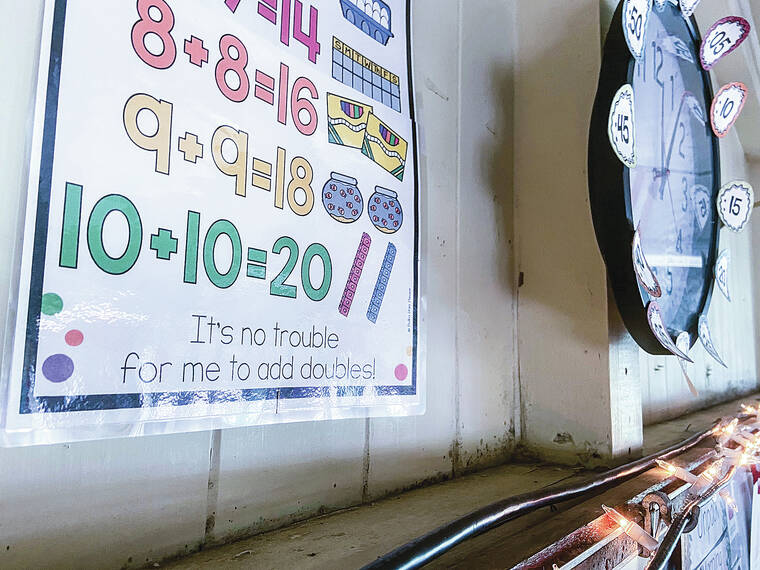
Mold is visible in a Holualoa Elementary School classroom. (HSTA Courtesy photo/Special to West Hawaii Today)
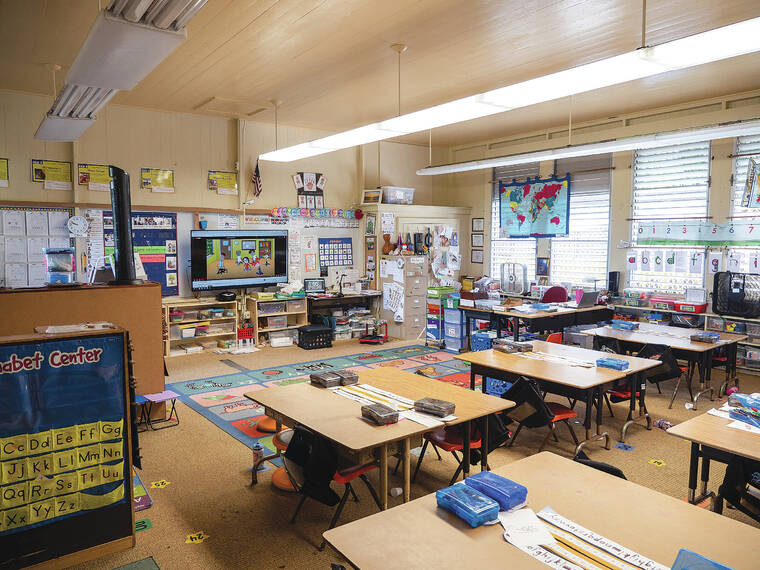
A Holualoa Elementary School classroom is seen. (HSTA Courtesy photo/Special to West Hawaii Today)
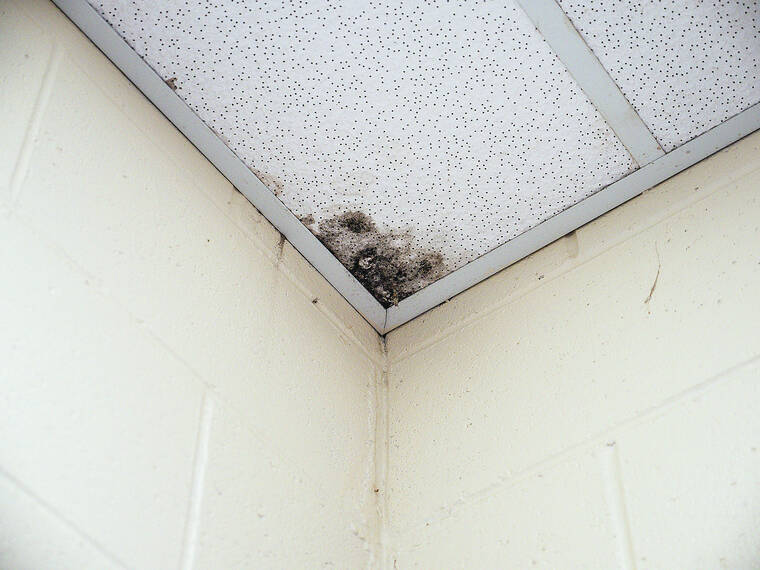
Mold is seen in a classroom ceiling tile. (HSTA Courtesy photo/Special to West Hawaii Today)
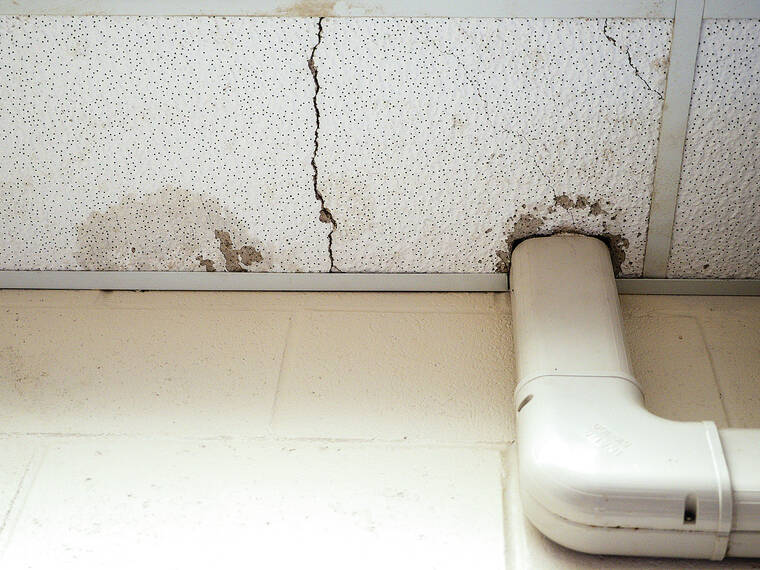
A classroom ceiling that is cracked and moldy is pictured. (HSTA Courtesy photo/Special to West Hawaii Today)

A Holualoa Elementary School classroom is seen. (HSTA Courtesy photo/Special to West Hawaii Today)
Hawaii’s teachers union, educators and parents Monday called out the state for what they say is a lack of action in addressing mold and rats in classrooms, structural damage and other persistent problems at Holualoa Elementary School.
Hawaii’s teachers union, educators and parents Monday called out the state for what they say is a lack of action in addressing mold and rats in classrooms, structural damage and other persistent problems at Holualoa Elementary School.
“Holualoa Elementary is one of the oldest schools in the state and we should be taking better care of it because it’s falling apart putting students and educators at risk of illness and injury,” said Logan Okita, a teacher at Nimitz Elementary and vice president of the Hawaii State Teachers Association. “HSTA’s primary goal here is to obtain clarity from the state. We want a plan to address the situation, including at the very least an outline of which repair maintenance and other projects will be completed and when.”
Okita was careful to note that the onus is on the state departments of Education and Accounting and General Services, not the school’s principal, custodians or teachers who she said have done their best.
“The principal has been strongly advocating for improvements at the school and custodial staff has done its best to keep things clean, teachers are constantly pivoting and doing their best by moving classrooms and making temporary fixes, but they need more help from the higher ups,” she said of the DOE and DAGS, which handles school building repair and maintenance.
Holualoa Elementary School, founded in 1895, has an enrollment close to 500 students and approximately 50 faculty and staff members. It is located at just over 1,200 feet elevation on the flanks of Hualalai in North Kona’s coffee country.
And while the school is just one of many with maintenance issues statewide, Holualoa is in a “crisis,” Okita said during a press conference.
“They are in a situation that is more acute and we are seeing those problems and we aren’t getting the answers that the teachers and the community need in order to know the students and the staff are being kept safe,” she said. “We are holding this today because we need to know there is a plan to address this and that plan isn’t only going to come out of the school’s budget because that takes away from the students need and what the student’s deserve.”
The Department of Education did not respond to an email seeking comment as of press-time. Monday was Presidents’ Day, a state-observed holiday.
The list of issues at the school is lengthy, but according to the three parties, mold is the most pressing. Mold, which the Environmental Protection Agency says has the potential to cause health problems, is visible on walls and ceilings, and is particularly problematic after closures for school breaks.
It’s resulted in classes being disrupted and teachers reporting testing positive for mold in their lungs and their doctors advising them not to return to their classrooms, as well as students missing school.
“Students haven’t been able to use the library since late last year because a first-grade class had to temporarily relocate into the library due to persistent mold problems in their classroom,” said Okita.
According to Okita, teachers told the union the school’s the principal requested professional cleaning of classrooms in November 2022. She added teachers were told by the state three years ago that decades-old carpeting would be removed and classrooms repainted to help with the mold, but that hasn’t happened either.
“Months later, it is still unclear when that will happen,” she said. On Feb. 9, she said, the school received dehumidifiers to help reduce moisture in classrooms.
Other issues, the parties said, include termite damage, structural concerns, lead paint peeling from ceilings, the January closure of the largest student restroom on campus, a roadway that goes through the middle of campus and vermin.
“Educators have found rat droppings on classroom materials, and the rats have chewed right through some books and other publications. Staff say rats crawl up and down tubing in the English (language) learners classroom through a hole in the ceiling,” Okita said. “They also chewed their way through fiber cable wires last month knocking out the Internet and phone service on campus. And, rats chewed up a pair of a teacher’s sandals left overnight in a classroom leaving them ravaged.”
Holualoa Elementary Student Services Coordi-nator Lisa Vail started in 1991 as a special education teacher and has seen first-hand many of the issues outlined Monday. She recounted stapling paper on the ceiling to keep termite droppings from falling on her students, filing a grievance in 2002 due to mold in her office in the main building, and watching rats climb behind her during video conferencing amid the pandemic.
“Nothing’s happened here. The only thing that has happened here is what our school has done. Our administrator bought dehumidifiers. The custodians are killing themselves cleaning. The only thing that has been done is from our school staff and nothing by the state and to me it’s just unacceptable,” she said. “We got the babies here, we’re on the Big Island, they grew up in vog, they’re already compromised. … It’s unacceptable and something needs to be done and I’m not going anywhere until it does.”
The short-term solution is professional cleaning, repainting, and removing all carpet and replacing it with tile, she said.
“The long-term solution is we need a new school and we’ve known that forever. I’m on my 15th principal. We have three master pans in the books that have never been funded by the Legislature,” Vail said.
First-grade teacher Courtney D’Agostino said the mold has created unsafe and unhealthy conditions for keiki and staff.
“My own health has been severely impacted. Over the past six months I’ve been in and out on medical leave. I am not someone who suffers from allergies, nor do I have underlying health conditions,” she said. “Friday was my last day on campus for a while. It’s for an extended time. I am not sure when I’ll be back and I’ve missed a lot of school and that leaves me not teaching our keiki, and that leaves them in other people’s hands. And, while we have great subs on campus this is my profession and I do what I do for our keiki.”
Sarah Teehee, a parent and vice president of the Parent-Teacher Organi-zation and a School Community Council member, said her son’s second-grade class was moved to the cafeteria for three days in early February due to rat excrement in a classroom.
“It’s not an ideal learning environment,” Teehee said. “It’s extremely hard on a teacher to pack up everything and move out and then try to conduct class in that kind of place. … It interrupts their learning opportunities. It interrupts so much.”
The mold has also taken her son out of class. In October, when he was unable to stop coughing, she had take him out of school and to a doctor who said his lungs were “very irritated and aggravated” though it was not due to COVID or RSV.
“All of these things are affecting his instructional time, his ability to learn,” she said. Despite her concerns, Teehee said she plans to enroll her daughter in kindergarten this fall, noting how much “heart” the teachers have at Holualoa Elementary School.
Though the conditions outlined during Monday’s press conference may raise parents’ concerns over their children’s safety at Holualoa Elementary School, the HSTA said it isn’t reason to move a child to a different campus.
“We aren’t asking parents to go and ask for their student to be moved because of the situation — we want to fix the situation so that students don’t have to feel unsafe in their classrooms,” Okita said.


